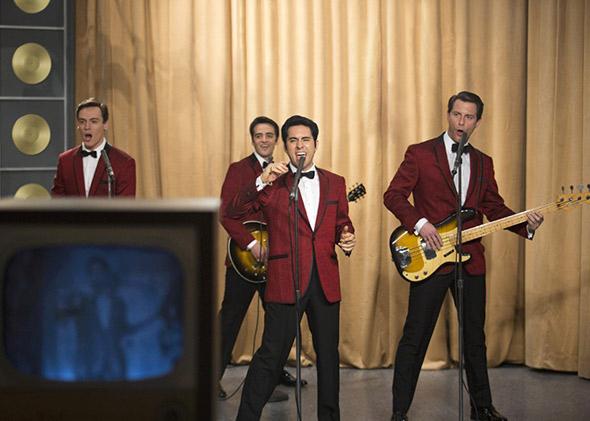Jersey Boys, Clint Eastwood’s curiously moribund adaptation of the still-running, multiple-Tony-winning Broadway jukebox musical about the career of doo-wop legends Frankie Valli and the Four Seasons, contains a fleeting appearance by the director’s younger self. In one scene, as two characters sit around watching a small, black-and-white TV (it’s the early ’60s, after all), Eastwood’s familiarly flinty face appears on the small screen, playing a cowboy in a Western. It’s a reminder that when these young Italian-American crooners were practicing their tight harmonies under the streetlights of New Jersey, Eastwood was already an established actor, doing his own thing far away on the West Coast—a reminder, if the movie itself wasn’t enough of one, that the regional and ethnic subculture depicted in Jersey Boys exists at a far remove from Eastwood’s own personal history at the time.
Given that Eastwood has never directed a musical before, he pulls off the performance numbers with a modicum of style. (He is, after all, a jazz aficionado who’s made a Charlie Parker biopic and composed the scores for seven of his own films, to say nothing of his own career as a crooner.) The choice to have the performers sing live to tape rather than lip-synch to prerecorded tracks gives the musical numbers a freshness and immediacy that’s absent from most of the dramatic scenes. Valli’s signature piercing falsetto is emulated to perfection by the vocally gifted John Lloyd Young, who played the role in the original Broadway production and won a Tony for it. But Young—like all of the actors playing the Four Seasons, with the exception of Vincent Piazza as the thuggish Tommy DeVito—is a stage performer imported directly from either the Broadway or touring company of Jersey Boys, and the shift between these two radically different mediums isn’t always smooth. For example, Young, who’s a baby-faced 38, also plays Valli in the early scenes as a 16-year-old kid—a convention that might work onstage, but that on film comes off as simply strange, especially when Frankie’s fellow band members (all played by actors roughly Young’s age) comment on his extreme youth.
In those early scenes, Frankie Valli is still Francesco Castelluccio, a nice kid growing up in a tightknit Italian-American enclave of North Jersey with some less-than-nice friends, including truants Tommy (Piazza) and Nick (Michael Lomenda), who enlist him as a driver in their small-time jewelry heists when they aren’t encouraging him to develop his singing voice with their band. While Nick and Tommy take turns doing jail time, Frankie makes his living as a barber. It isn’t until the band adds a keyboardist and songwriter, Bob Gaudio (Erich Bergen)—best known at the time as the teenage composer of the novelty song “Short Shorts”—that the Four Seasons find their sound, as well as a manager, the flamboyantly gay Bob Crewe (Mike Doyle) who knows something about the business of hit-making, not to mention old-fashioned radio payola.
In short order, this prolific pair of Bobs co-write a string of hits—“Sherry,” “Big Girls Don’t Cry,” “Walk Like a Man”—that propel the group’s hooky sound to the top of the charts. (The musical backdrop against which all this is happening, strangely, is rendered as a contextless blank—in this movie’s version of the ’60s, neither the Beatles nor Motown seem to exist, though we do get a glimpse of the girl group the Angels singing “My Boyfriend’s Back.”) The middle section of the film slips into overfamiliar musical-biopic territory, as the boys’ early camaraderie is worn down due to the tensions of constant touring and the gradual revelation of Tommy’s gambling problem (which has him in serious debt to the mob and embezzling from the band’s tax fund). Local mob kingpin Gyp DeCarlo (Christopher Walken) tries to bail the boys out of financial trouble, but he can’t solve the family problems caused by years spent on the road. Frankie’s once-vibrant wife Mary (Renée Marino) has become a bitter, lonely alcoholic, and their daughter Francine (Freya Tingley)—who emerges in the third act as a character the audience is suddenly expected to care about—has been running away from home, experimenting with drugs, and neglecting to develop her singing talent. (She had singing talent? News to us.)
As the third-act melodrama ramps up to a feel-good finale—the band’s triumphant 1975 comeback with “December, 1963 (Oh, What a Night)” and their eventual induction into the Rock and Roll Hall of Fame—Eastwood makes increasing use of a direct-address-to-the-camera device introduced early in the film, in which each band member recounts events from his own point of view. It isn’t until the closing credits, which feature a big, bouncy all-cast performance of the irresistibly sing-able “December, 1963,” that this awkwardly transposed stage musical begins to find a voice of its own. That last big production number—in which every character, including Walken’s suave gangster, gets a walk-on (or dance-on) role—hints at the broad, cheerfully campy musical celebration Jersey Boys might have been. If you want to see that show, tickets for the Broadway production are still available.
